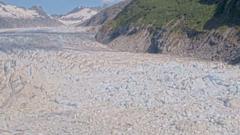U.S. President Donald Trump and Russian President Vladimir Putin are set for a pivotal summit in Alaska, where contrasting motivations guide their talks. Putin seeks international recognition and territorial gains in Ukraine, while Trump aims to position himself as a peacemaker, despite recent unpredictable statements. The meeting could reshape U.S.-Russia relations and has major implications for Ukraine.
What Trump's and Putin's Summit in Alaska Means for U.S.-Russia Relations

What Trump's and Putin's Summit in Alaska Means for U.S.-Russia Relations
As Trump and Putin prepare for their Alaska summit, their differing agendas signal complex negotiations ahead concerning Ukraine and global diplomacy.
U.S. President Donald Trump and Russian President Vladimir Putin are gearing up for a high-stakes summit in Anchorage, Alaska, on Friday, with each leader bringing unique priorities to the discussion table. Amid escalating tensions due to Russia's ongoing war in Ukraine, both leaders might view the summit as an opportunity for their respective agendas, potentially shifting their diplomatic standing on the global stage.
For Putin, the summit represents a chance for validation. The Kremlin views the meeting as a sign that previous Western attempts to isolate Russia have failed. The location also plays into his hands; Alaska's proximity to Russia allows for a summit that strategically distances the discussions from Ukraine and European leaders, which aligns with Moscow's objective of negotiating directly with the U.S. Moreover, the historical context of Alaska being sold from Russia to America serves as a reminder of shifting territorial claims and borders, which Putin may leverage as he insists on retaining the land seized during the conflict in Ukraine.
Conversely, Trump enters the summit with ambitions of portraying himself as a global peacemaker. His 2024 campaign featured promises that he could end the Ukraine conflict swiftly, yet he has faced criticism for his unpredictable actions regarding aid to Ukraine. Although he has expressed frustration at both Ukraine and Russia, Trump has been keen on negotiating peace, which includes discussions of "land swapping," raising concerns that it could involve concessions from Ukraine's side.
While Trump has been managing expectations for the summit, describing it as a preliminary "feel-out" meeting, he remains eager to achieve a tangible result that might bolster his legacy as a peacemaker. This desire for recognition, possibly including a Nobel Peace Prize, drives his agenda. Yet, his fluctuating stance creates uncertainty about possible outcomes, with allies like Ukrainian President Volodymyr Zelensky expressing worries that a US-Russia deal could undermine Ukraine's territorial integrity.
As the summit draws closer, analysts will watch closely to discern whether Putin and Trump can find common ground—and at what cost for Ukraine and the international community.




















